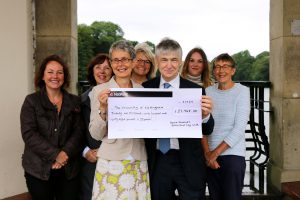August 16, 2016, by Liz Cass
Walkers raise more than £21,000 for Breast Cancer research
Inspired by University research to develop a test to detect breast cancer early, Denise Kendrick, Professor of Primary Care Research in the School of Medicine, made a decision to trek the Robin Hood Way to help raise vital funds.
Back in June, with a team of more than 70 supporters, family and friends, she trekked 105 miles along the the Robin Hood Way in aid of Nottingham Life Cycle 6.
Life Cycle 6 is a fundraising endurance ride led by Professor Sir David Greenaway, Vice-Chancellor of the University of Nottingham, and one of the flagship fundraising events in the #BreastCancerAndMe campaign launched by the University earlier this year.
The campaign has a £1 million target and funds will go directly into the university’s laboratories to support world-leading breast cancer research.
Denise, who was diagnosed with breast cancer herself in 2008, followed the route of the Robin Hood Way, from Nottingham Castle to Edwinstowe, after being inspired by the work of breast cancer researcher, Professor John Robertson.
Following on from his success in developing the world’s first blood test to detect lung cancer, currently undergoing a large-scale clinical trial in Scotland, John is now applying the technology to help detect breast cancer early. This simple blood test could revolutionize
breast cancer screening, helping save the lives of thousands of women around the world.
Denise said, “I’m delighted that the money we’ve raised is going to a cause so close to my heart. Breast cancer is so common that it touches so many people’s lives in some way or other. This research really does have the potential to make a difference.
“My father died when I was eight and my aunt was really important in helping to bring up my sisters and myself. It’s now 24 years since she died of breast cancer; leaving two young daughters. I also had breast cancer myself in 2008 and shortly after that I found out about John’s work.
“The blood test John is working on has the potential to prevent women from having to have surgery, radiotherapy and chemotherapy and to save lives. It’s really important and I thought this walk would be a nice way of doing something in memory of my aunt.
“Many more people than I could ever have imagined took part, including my aunt’s two daughters. Everyone worked so hard at fundraising, with amazing results. The weather was appalling with loads of rain, but nobody moaned, everyone was cheerful and we just did it!”
The Life Cycle 6 team are due to set off on Friday 19th August. For more information about the research and to sponsor the team visit the Life Cycle pages.
No comments yet, fill out a comment to be the first


Leave a Reply